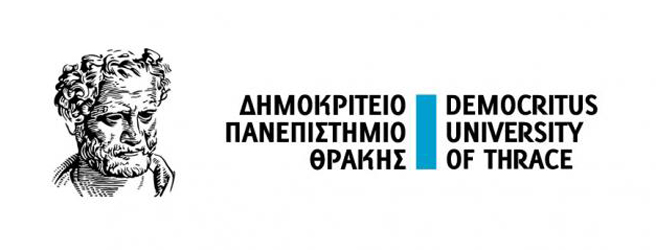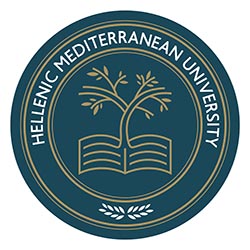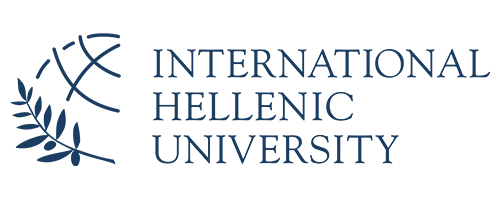Institutional Partners in Greece

Democritus University of Thrace
Democritus University of Thrace (DUTH), is a polyedric University founded in Komotini in 1973. As an Institution of Higher Education, DUTH is a Public Institution with full administrative autonomy. It is subject to state supervision via the Ministry of Education and Religious Affairs, which also provides its funding. Starting its educational and scientific work in 1974, DUTH has built up by today 20 Departments grouped into 8 Faculties:
- Faculty of Law
- Faculty of Physical Education and Sport Science
- Faculty of Classical Studies and Humanities: Department of History and Ethnology, Department of Greek Literature, Department of Languages, Literature and Culture of the Black Sea Countries
- Faculty of Social, Political and Economic Sciences: Department of Economic Sciences, Department of Social Work, Department of Social Policy, Department of Political Science
- Faculty of Engineering: Department of Architectural Engineering, Department of Civil Engineering, Department of Electrical and Computer Engineering, Department of Environmental Engineering, Department of Production and Management Engineering
- Faculty of Health Sciences: Department of Medicine, Department of Molecular Biology and Genetics
- Faculty of Educational Sciences: Department of Education Sciences in Pre-School Age, Pedagogical Department of Primary Level Education
- Faculty of Agricultural and Forestry Sciences: Department of Agricultural Development, Department of Forestry & Management of Environment and Natural Resources
For more information visit: http://duth.gr/en#

Harokopio University
Harokopio University of Athens is a state University located near Athens downtown. In was founded by the national benefactor Panagis Harokopos in 1919, while operating in its current legal form since 1990. The main campus is located in a 2 hectares estate endowed by the founder in Kallithea, Athens. It is dedicated in improving the Quality of Life embracing the vision of its founder. Disciplines related to heath science, technology, environment, sustainable development and their impact to society are nourished. In conjunction with public funding, it continues the tradition in mobilizing private funding through “Harokopos Foundation” and all its research and development activities, accumulating additional resources exceeding state funding.
It constitutes a research University achieving top rankings at national level, where more than one third of the student population are postgraduate and PhD students. The University and all the programs provided are fully accredited according to EU standards, while its urban campus is recognized and awarded as an exemplary studying environment. It has formed a Green University policy since 2016 to promote environmental sensitivity and reduce energy cost.
The University fosters its international profile by actively participating in EU Erasmus programs and hosts students and researchers from European Universities, utilizing mobility agreements. It also offers international master programs in English in collaboration with European Universities, as for example a master on Sustainable Tourism in collaboration with Paris Sorbonne I University or the latest on Migration Studies in collaboration with four European Universities (accepting students September 2021).
For more information visit: https://www.hua.gr/index.php/en/

Hellenic Mediterranean University
The Hellenic Mediterranean University-HMU (www.hmu.gr) is the evolution of the Technological Educational Institute of Crete (founded in 1983) which was renamed as the Hellenic Mediterranean University during the reformation process of the Hellenic Higher Education system which took place in Greece in 2019. HMU has its main campus in Heraklion Crete and branches in Chania, Rethymno, Agios Nikolaos and Sitia. It currently consists of 5 Faculties and 11 Academic Departments, with approximately 12,000 undergraduate and postgraduate students and approximately 300 permanent and part-time teaching and research staff.
The University provides high-quality undergraduate, postgraduate and doctoral education in the fields of Engineering, Management and Economics, Health, Agronomy and Music & Opto-acoustics Technology, and conducts high-impact research in the aforementioned subjects which is reflected in scientific publications in high-profile scientific journals and in the success in undertaking and participating in research programs, both national and international. HMU utilizes the research outcomes for the benefit of the Hellenic society, contributes to the professional specialization of young scientists, provides public and private services, develops collaborations with educational and research institutions in Greece and abroad and undertakes research, development and consulting activities in cooperation with national and international organizations.
For more information please visit: https://www.facebook.com/HellenicMediterraneanUniversity/

International Hellenic University
The International Hellenic University (IHU) was initially established by Law 3391/2005 and was based in Thessaloniki, Greece. The IHU was Greece’s first and only public university where all programmes were taught exclusively in English. It comprised three (3) Schools which offered twenty-four (24) postgraduate programmes.
The external evaluation of IHU, which took place according to the provisions of the Hellenic Quality Assurance & Accreditation Agency, evaluated the University as “Worthy of Merit” which is the highest possible evaluation that an institution can achieve.
The University was re-established by Law 4610/2019, after merging with the former Alexander Technological Educational Institute of Thessaloniki, the former Technological Educational Institute of Central Macedonia, and the former Technological Educational Institute of Eastern Macedonia and Thrace.
The IHU comprises nine (9) Schools, thirty-two (32) Departments and sixty (60) Postgraduate programmes offering a range of study areas defined by great variety and scope. Currently, 53,591 undergraduate students, 3,968 postgraduate students and 400 international students are pursuing their studies at the IHU, which has campuses in Thessaloniki, Kavala, Serres, Drama, Katerini, Edessa, Kilkis, Didymoteicho.
The IHU also operates the University Center of International Programmes of Studies (UCIPS) as a special academic unit offering programmes of first, second and third cycle that are taught exclusively in English to Greek and foreign students.
The mission of the IHU focuses on three (3) main areas:
Excellence in Education & Teaching
- provide high quality education by ensuring excellent teaching and administrative support for all students
- produce graduates highly competitive in the labour market
- achieve high satisfaction rates of students from their overall IHU learning experience
- monitor and analyse the staff’s research productivity and teaching performance.
Excellence in Research
- become a high-level research center, ensuring international academic recognition
- emphasize on interdisciplinary research and on its utilization by society and companies.
Internationalization
- enhance research and educational partnerships with foreign institutions
- increase the number of foreign students
- increase the mobility of students and academic staff of the institution
- promote our international and diverse student and faculty community to foster greater understanding between cultures and nations.
For more information visit: https://www.ihu.gr/en/enhome/

National and Kapodistrian University of Athens
The National and Kapodistrian University of Athens—founded in 1837—is the oldest and largest state institution of higher education in Greece, and among the largest universities in Europe. It is a fully self-governed legal entity of public law. Its role has been historically and socially decisive for education and promotion of cultural life in the country and beyond.
The NKUA offers 42 undergraduate programs, 188 postgraduate programs, of which 15 are taught in one or more foreign languages, and 415 e-learning programs. The NKUA has 44,658 undergraduate and 21,272 graduate and PhD students. 5 University Research Institutes, 3 University Hospitals, 70 Clinics, 224 University Laboratories, 11 libraries and 13 thematic museums.
Internationalization is one of the cornerstones of the university’s strategic plan. Currently there are 78 active Agreements of the NKUA with Universities/ Institutions from 36 countries world-wide as well as 761 ERASMUS+ agreements with 384 Universities of 40 countries. Since the beginning of Erasmus (1987) the NKUA has been actively participating in the program; since then, an overall of 5,735 incoming students from more than 38 countries and 13,863 outgoing students have participated in the program.
The NKUA is a founding and active member of:
- UNIMED (Mediterranean Universities Union)
- UNICA (Network of Universities from the Capitals of Europe)
- BSEMAN (Black Sea and Eastern Mediterranean Academic Network)
The NKUA is a signatory of the “Magna Charta Universitatum” and participates in:
- IAU (International Association of Universities)
- EUA (European University Association)
- ΕΑΙΕ (European Association for International Education)
- UNEECC (University Network of the European Capitals of Culture)
- BUA (Balkan Universities Association)
- SUN (Silk-road Universities Network)
Additionally, the university has the following three UNITWIN UNESCO Chairs:
- UNESCO Chair and Network on Sustainable Development Management and Education in the Mediterranean (MEdIES)
- UNESCO Chair in Adolescent Health Care
- UNESCO Chair on Climate Diplomacy
For more information visit: https://en.uoa.gr/
